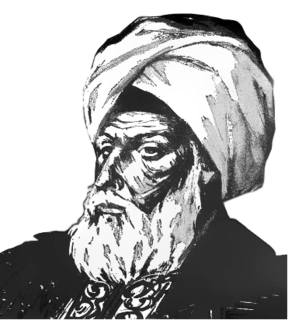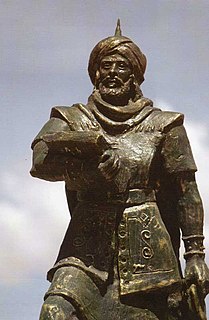 W
WAbu Zayd Ibn Rizq Al-Hilali listen (help·info) was an 11th-century Arab leader and hero of the 'Amirid tribe of Banu Hilal.
 W
WAbū'l-Fawāris Muḥammad ibn Nāṣir al-Dawla was a Hamdanid prince, active as a governor and general for his uncle, Sayf al-Dawla, Emir of Aleppo.
 W
WAli ibn Abi Talib was a cousin and son-in-law of the Islamic prophet Muhammad, who ruled as the fourth caliph from 656 to 661. He is one of the central figures in Shia Islam and is regarded as the rightful immediate successor to Muhammad as an Imam by Shia Muslims.
 W
WAbd al-Rahman ibn Abd Allah al-Ghafiqi, also known as Abd er Rahman, Abdderrahman, Abderame, and Abd el-Rahman, was an Umayyad commander of Andalusian Muslims. He unsuccessfully led into battle against the forces of Charles Martel in the Battle of Tours on October 10, 732 AD.
 W
WAbū Muhammad al-Ḥajjāj ibn Yūsuf ibn al-Ḥakam ibn ʿAqīl al-Thaqafī, known simply as al-Hajjaj ibn Yusuf, was perhaps the most notable governor who served the Umayyad Caliphate. He began his service with the Umayyads under Caliph Abd al-Malik, who successively promoted him as the head of the caliph's shurta, the governor of the Hejaz in 692–694, and the practical viceroy of a unified Iraqi province and the eastern parts of the Caliphate in 694. Al-Hajjaj retained the last post under Abd al-Malik's son and successor al-Walid I, whose decision-making was highly influenced by al-Hajjaj, until his death in 714.
 W
WMalik al-Ashtar, also known as Mālik bin al-Ḥārith al-Nakhaʿīy al-Maḏḥijīy, was one of the most loyal companions of Ali Ibn Abi Talib, cousin of Prophet Muhammad. Malik al-Ashtar became a Muslim during the time of Prophet Muhammad and since then remained an avid and loyal supporter of Muhammad's progeny and Hashemite clan. He rose to a position of prominence during the caliphate of Ali Ibn Abi Talib and participated in several battles, such as the Battle of Jamal and Siffin.
 W
WMarwan ibn Muhammad ibn Marwan ibn al-Hakam, also called Marwan II, was the fourteenth and last caliph of the Umayyad Caliphate, ruling from 744 until he was killed in 750. Much of his reign was dominated by the Third Muslim Civil War, and he was the last Umayyad ruler to rule the united Caliphate before the Abbasid Revolution toppled the Umayyad dynasty.
 W
WMuhammad was an Arab religious, social, and political leader and the founder of Islam. According to Islamic doctrine, he was a prophet, sent to preach and confirm the monotheistic teachings of Adam, Abraham, Moses, Jesus, and other prophets. He is believed to be the final prophet of God in all the main branches of Islam, though some modern denominations diverge from this belief. Muhammad united Arabia into a single Muslim polity, with the Quran as well as his teachings and practices forming the basis of Islamic religious belief.
 W
WMusa bin Nusayr served as a Umayyad governor and an Arab general under the Umayyad caliph Al-Walid I. He ruled over the Muslim provinces of North Africa (Ifriqiya), and directed the Islamic conquest of the Visigothic Kingdom in Hispania.
 W
Wal-Malik al-Afdal Najm ad-Dīn Ayyūb ibn Shādhi ibn Marwān was a Kurdish soldier and politician from Dvin, and the father of Saladin. He is the eponymous ancestor of the Ayyubid dynasty.
 W
WSaʿd ibn Abī Waqqās, also known as Saʿd ibn Malik, was one of the companions of the Islamic prophet. Saʿd was reportedly the seventh person to embrace Islam, which he did at the age of seventeen. He is mainly known for his commandership in the Battle of al-Qadisiyyah and in the conquest of Persia in 636, his governorship over Persia, and his diplomatic sojourns to China in 651.
 W
WʿAlī ibn ʾAbū l-Hayjāʾ ʿAbdallāh ibn Ḥamdān ibn al-Ḥārith al-Taghlibī, more commonly known simply by his laqab of Sayf al-Dawla, was the founder of the Emirate of Aleppo, encompassing most of northern Syria and parts of western Jazira, and the brother of al-Hasan ibn Abdallah ibn Hamdan.
 W
WʿUqba ibn Nāfiʿ was an Arab general serving the Rashidun Caliphate since the Reign of Umar and later on the Umayyad Caliphate during the reigns of Muawiyah I and Yazid I, leading the Muslim conquest of the Maghreb, including present-day Algeria, Tunisia, Libya and Morocco.